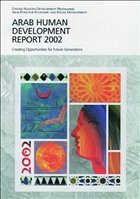Nicht lieferbar

Arab Human Development Report 2002
Creating Opportunities for Future Generations
Versandkostenfrei!
Nicht lieferbar
From the Atlantic to the Gulf, people -- women, men and children -- are the real wealth and hope of Arab countries. Policies for development and growth in the Arab region must focus on freeing people from deprivation, in all its forms, and expanding their choices. Over the last five decades, remarkable progress has been achieved in advancing human development and reducing poverty. However, much still needs to be done to address the backlog of deprivation and imbalance. Since 1990, the United Nations Development Programme (UNDP) has been providing (and Oxford University Press has been publishin...
From the Atlantic to the Gulf, people -- women, men and children -- are the real wealth and hope of Arab countries. Policies for development and growth in the Arab region must focus on freeing people from deprivation, in all its forms, and expanding their choices. Over the last five decades, remarkable progress has been achieved in advancing human development and reducing poverty. However, much still needs to be done to address the backlog of deprivation and imbalance. Since 1990, the United Nations Development Programme (UNDP) has been providing (and Oxford University Press has been publishing) annual Human Development Reports that set out the basic social and economic indicators for the nations of the world. The Arab Human Development Report 2002, published this summer by the UNDP's Regional Bureau of Arab States (RBAS), is the first regional report of its kind. Focusing exclusively on the Arab world, the Report carefully dissects and analyzes the region's strengths and failings and explains why the region has fallen behind so much of the world. Written by a team of elite Arab intellectuals and policymakers, the Report concludes that the Arab world today is a civilization bypassed by global trade, democracy, technology, and by women's rights. Scrutinizing the 22 member states of the Arab League and their 280 million people, the Report argues that the root cause for Arab underdevelopment is threefold - three deficits: a deficit of freedom, a deficit of women's rights, and a deficit of knowledge. The Report probes the causes of these deficits and identifies three areas where Arab institutional structures are hindering performance and crippling human development: governance, women's empowerment, and knowledge.
This report, the first regional Human Development Report for the Arab States, covers a total of 22 countries from the Maghreb to the Gulf. The report has some encouraging findings and hightlights substantial progress over the past three decades. Life expectancy has increased by 15 years; mortality rates for children under five years of age have fallen by about two thirds; adult literacy has almost doubled-and women's literacy has trebled-reflecting large increases in gross educational enrollments. Yet it is evident that Arab countries have not developed as quickly as comparable nations in other regions. More than half of Arab women are illiterate. The region's infant mortality rate is double that of Latin American and the Caribbean, and four times that of East Asia. And over the past 20 years, growth per capita income was the lowest in the world except sub-Saharan Africa. This ambitious Report probes the causes of these deficits and identifies three areas where Arab institutional structures are hindering performance and crippling human development: governance, women's empowerment, and knowledge.
This report, the first regional Human Development Report for the Arab States, covers a total of 22 countries from the Maghreb to the Gulf. The report has some encouraging findings and hightlights substantial progress over the past three decades. Life expectancy has increased by 15 years; mortality rates for children under five years of age have fallen by about two thirds; adult literacy has almost doubled-and women's literacy has trebled-reflecting large increases in gross educational enrollments. Yet it is evident that Arab countries have not developed as quickly as comparable nations in other regions. More than half of Arab women are illiterate. The region's infant mortality rate is double that of Latin American and the Caribbean, and four times that of East Asia. And over the past 20 years, growth per capita income was the lowest in the world except sub-Saharan Africa. This ambitious Report probes the causes of these deficits and identifies three areas where Arab institutional structures are hindering performance and crippling human development: governance, women's empowerment, and knowledge.



